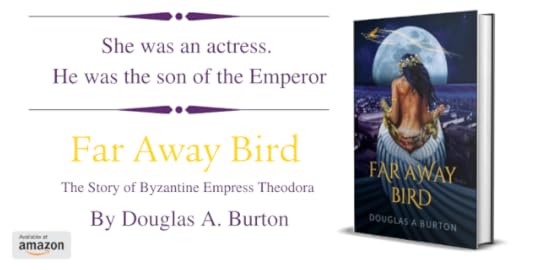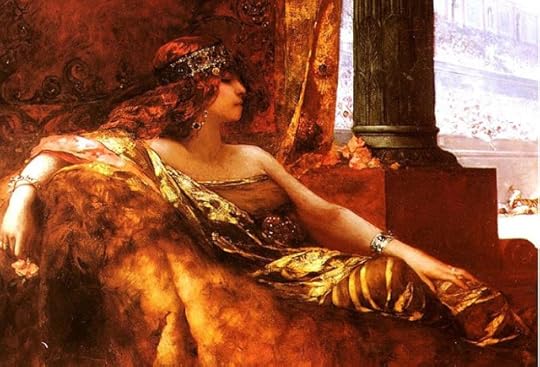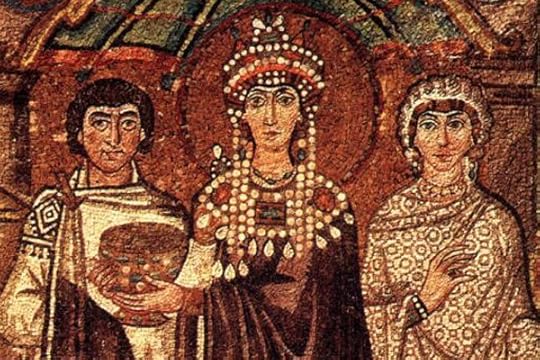Join #HistoricalFiction author, Douglas A. Burton, as he takes a look at Empress Theodora and the Origin of Women’s Rights @douglasaburton

Empress Theodora and the Origin of Women’s RightsBy Douglas A. Burton
There are many currents that flow into the story of women’s rights. Many cultures are recognized for their egalitarian traditions and we have countless examples of great women in power—from the pharaoh Hatsheput to Queen Victoria to Eleanor Roosevelt. But one woman—Empress Theodora— achieved such a decisive victory for women in her time that her relative obscurity is breathtaking. More than fifteen hundred years ago, Theodora helped influence massive legal reforms aimed at improving the plight of women. During her reign, she influenced parts of a legal codex known as the Corpus Juris Civilis, which included a wave of specific rights for women. Historians credit this body of Roman law as central source material to the legal tradition of Western civilization. Whoa. Therefore, Theodora made direct contributions to a legal system that survived into the American Constitution, English common law, and even international public law. It’s rare to see such lofty legalism in the early Medieval era, but rarer still to know the individual woman behind the campaign. But who the hell is she? What laws did Empress Theodora change? And how could such an influential woman be forgotten?
“Therefore, Theodora made direct contributions to a legal system that survived into the American Constitution, English common law, and even international public law.”
Abandoned by most Western thinkers throughout the centuries, Empress Theodora came off as a salacious novelty, a Medieval prostitute-stripper who made it to the top through a lucky marriage. The scandalous gossip
 The Empress Theodora at the Colosseum, oil painting by Jean-Joseph Benjamin-Constant: Wikipedia.Theodora also saw to it that women could own and inherit propertyUnlike today, professional outlets for women were severely restrictive. Besides the socially acceptable “work-from-home-and-raise-a-family” jobs, such as weaving, innkeeping, or baking, the very concept of ‘professional women’ as a large and recognizable class did not exist with one exception. A large number of women worked in theaters and brothels. So, although this professional class of women carried a huge social stigma, their industry was one of the few places where women worked publicly outside the traditional family structure and earned real income. Therefore, laws that addressed legal matters for this lowly and socially powerless group is bold and unashamedly supportive of women in general. Theodora meant to treat the professional women of her society, sex workers though they may be, asprofessionals. She understood that these prostitutes, actresses, mimes, and singers earned money and could technically sustain themselves independently. But brothel keepers had legal authority over these women. So, Theodora shifted that legal authority back to women.
The Empress Theodora at the Colosseum, oil painting by Jean-Joseph Benjamin-Constant: Wikipedia.Theodora also saw to it that women could own and inherit propertyUnlike today, professional outlets for women were severely restrictive. Besides the socially acceptable “work-from-home-and-raise-a-family” jobs, such as weaving, innkeeping, or baking, the very concept of ‘professional women’ as a large and recognizable class did not exist with one exception. A large number of women worked in theaters and brothels. So, although this professional class of women carried a huge social stigma, their industry was one of the few places where women worked publicly outside the traditional family structure and earned real income. Therefore, laws that addressed legal matters for this lowly and socially powerless group is bold and unashamedly supportive of women in general. Theodora meant to treat the professional women of her society, sex workers though they may be, asprofessionals. She understood that these prostitutes, actresses, mimes, and singers earned money and could technically sustain themselves independently. But brothel keepers had legal authority over these women. So, Theodora shifted that legal authority back to women. “These reforms should be regarded as revolutionary since they shattered the most powerful class barriers.”
Under the new laws, no woman could be forced into prostitution“Therefore, when Theodora helped to facilitate the removal of the marriage ban, she did so without the support of either the secular or religious tradition.”
Once, Theodora arranged a marriage between one of her theater friends (an ex-prostitute) and a nobleman named Saturnitus
 Mosaic of Theodora: Wikipedia.
Mosaic of Theodora: Wikipedia.Finally, in what I regard as a remarkable example of Theodora’s scope, sympathies, and real-world knowledge, she even dared to protect criminal women. In the Sixth Century, protection for male criminals wasn’t even a concern. That’s why I regard Theodora’s intervention on behalf of criminal women to be truly groundbreaking. If a woman required prison time, the new laws forbade her imprisonment in common jails where she had no protection from male guards who could abuse these women without recourse. She saw to it that criminal women were removed from common prisons and detained in a nunnery (that she constructed), under the supervision of other women. Empress Theodora was known to hold court in her opulent imperial bedchamber. There, surrounded by a retinue of her most trusted women and eunuchs, she ruled over what has been described as an almost “parallel government“The scene in Theodora’s bedchambers must have mirrored the impressive throne room of the Byzantine Empire, just a few hundred feet away.”
Theodora’s mark on history is a powerful, immovable example for us. The body of laws that came into being during her reign is known as the Corpus Juris Civilis and, according to Wikipedia: “The Corpus continues to have a major influence on public international law. Its four parts thus constitute the foundation documents of the Western legal tradition
Far Away Bird
By Douglas A. Burton

Inspired by true events, Far Away Bird delves into the complex mind of Byzantine Empress Theodora. This intimate account deftly follows her rise from actress-prostitute in Constantinople's red-light district to the throne of the Byzantine Empire.
Her salacious past has left historians blushing and uncomfortable. Tales of her shamelessness have survived for centuries, and yet her accomplishments as an empress are unparalleled. Theodora goes on to influence sweeping reforms that result in some of the first ever Western laws granting women freedom and protection. More than a millennium before the women's rights movement, Theodora, alone, took on the world's greatest superpower and succeeded. Far Away Bird goes where history classrooms fear to tread in hopes that Theodora can finally take her seat among the greatest women in history.
Theodora seems impossible--yet her transcendence teaches us that society can't tell us who we are deep down. Before there was a legendary empress, there was a conflicted young woman from the lower classes.
And her name was Theodora.
The Coffee Pot Book Club
★★★★★
Highly Recommended
Read the full review HERE!

The Historical Fiction Book of the Year
2019
The Early Medieval Period
Gold Medal

Debut Novel Book of the Year 2019
Silver Medal

Pick up your copy of Far Away BirdAmazon UK • Amazon US
Douglas A. Burton
 Douglas Alan Burton is a speaker, author, and expert storyteller whose work depicts heroic figures and their deeper connection to the human experience. Doug blogs about heroes, heroines, and villains in pop culture with some unexpected and refreshing perspective. He grew up in what he describes as “the heroic boyhood culture of late Generation X” that has gone mainstream around the world. He also shares strategies with fellow writers for writing compelling heroic characters in fiction.
Douglas Alan Burton is a speaker, author, and expert storyteller whose work depicts heroic figures and their deeper connection to the human experience. Doug blogs about heroes, heroines, and villains in pop culture with some unexpected and refreshing perspective. He grew up in what he describes as “the heroic boyhood culture of late Generation X” that has gone mainstream around the world. He also shares strategies with fellow writers for writing compelling heroic characters in fiction.Douglas recently began outlining a breakthrough storytelling model that reveals a fascinating “heroine-centric” model for story structure he calls The Heroine’s Labyrinth. He believes a powerful new archetype is emerging for women in fiction. His forthcoming novel, Far Away Bird, which centers on the early life of Byzantine Empress Theodora, won the 2019 Manuscript Content for Historical Fiction from the Writers’ League of Texas.
Connect with Douglas: Website • Blog • Twitter.
References:
Published on February 19, 2020 20:00
No comments have been added yet.
The Coffee Pot Book Club
The Coffee Pot Book Club (formally Myths, Legends, Books, and Coffee Pots) was founded in 2015. Our goal was to create a platform that would help Historical Fiction, Historical Romance and Historical
The Coffee Pot Book Club (formally Myths, Legends, Books, and Coffee Pots) was founded in 2015. Our goal was to create a platform that would help Historical Fiction, Historical Romance and Historical Fantasy authors promote their books and find that sometimes elusive audience. The Coffee Pot Book Club soon became the place for readers to meet new authors (both traditionally published and independently) and discover their fabulous books.
...more
...more
- Mary Anne Yarde's profile
- 160 followers



